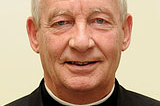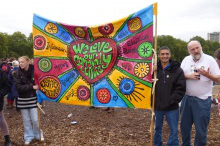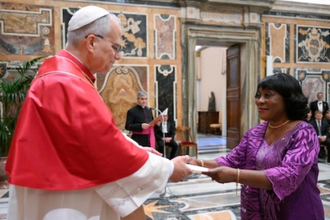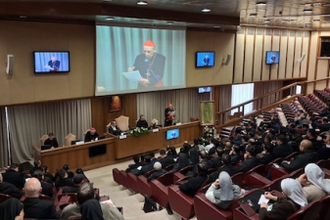Text: Frances O’Grady on 'Trade Unions: delivering justice at work and in society'

Frances O’Grady
The following talk was given at the Annual Conference of the National Justice and Peace Network 15-17 July 2011. The theme of the conference was ‘Justice at Work: A place of safety, fulfilment and growth?’
Trade Unions: delivering justice at work and in society'
I want to begin by paying tribute the work you do within the National Justice and Peace Network – striving for social justice in this country and right around the world, putting the social teachings of the Catholic Church into practice. Thank you for being both welcoming and willing to have a dialogue with a representative of a trade union movement which represents people of all faiths and none.
I was brought up a Catholic in my home town of Oxford, which in the 1960s and 70s was a place very much divided between town and gown. As a child, on Saturday mornings I went along to a convent run by the Society of the Sacred Heart. If I remember rightly the nuns were teachers – out and about in the community and especially reaching out to young people. My parents were union people so at an early age I’d already learned something about working conditions in shops and factories, the worry of making a wage packet stretch to the end of the week, and the importance of workers sticking together and standing up for their rights.
But it was at the convent that I first learned about racism and the wider world. I remember very vividly a film we were shown about apartheid South Africa – the shock of discovering that which school you attended, the hospital you used and who you could marry were all determined simply by the colour of your skin. It was there I learned that injustice takes many forms and that it is a moral imperative to resist that injustice. That the purpose of our lives was what not we what did for ourselves, but what we did others. So while I am no longer a practising Catholic I owe at least some of my education to those nuns.
And I know that Catholic social teaching – that we all have a right to dignity, that we are all bound together in solidarity, that we all belong to one human family – still resonates with me today.
In a world where the gap between the super rich and everyone else has become a yawning chasm, where so many of our fellow global citizens are enslaved by grinding poverty, the need for a strong moral compass is greater than ever before.
Across the world, many Catholics continue to be a powerful voice for social justice. A few months ago I heard about how a group of nuns – led by Sister Nora Nash of the Sisters of St Francis of Philadelphia – highlighted the global inequality in a way that captured the imagination of millions.
They attended the annual shareholder meeting of Goldman Sachs – the richest and most powerful investment bank in the world – and confronted its chief executive, Lloyd Blankfein. This is the man who last year famously claimed to be “doing God’s work” – at the same time as he earned $19 million, and his firm was found guilty of fraud by the Securities and Exchange Commission and was also accused of misleading the US Congress. Well, Sister Nora simply stood up and asked Mr Blankfein to justify his pay. As she pointed out: “executives have amassed untold wealth while a billion people suffer from poverty and food insecurity. We believe that the purpose of economic activity is to promote and protect the public good, and we ask Goldman Sachs to join us in this endeavour.” I think Sister Nora spoke for us all.
I want to talk to you today about the importance of work to our lives; about how we all have a right to decent work and fair treatment; and about how we in the trade union movement can help deliver justice in the workplace and in society. I believe our values – solidarity; collectivism; the deep conviction that workers are stronger together as brothers and sisters – have never been more relevant, nor more needed, than now. Like you we believe that every human being has a right to live in peace, dignity and freedom; that we all have a right to food, shelter, healthcare and education; and that we also have a right to work that is meaningful and fulfilling. Work that enables people to provide for themselves and their families – and that contributes to the wider collective good. And like you, we in the trade union movement believe we have a duty to tackle poverty, social exclusion and inequality both in this country and around the world.
In our different ways, I think the key challenge we face – trade union movement and Catholic Church alike – is putting our values into practice, ensuring our principles shape the world around us, delivering justice to the poor, the vulnerable and ordinary working men and women.
Let me start with our role in the workplace. After all, it’s where we spend a large proportion of our lives – a place that shapes our quality of life, our friendships, and our sense of who we are. Yet it’s also a place where too many of us are unhappy, unfulfilled and unrewarded for what we do. And sometimes we feel powerless to act.
That’s where we in the trade union movement come in. We believe it is possible for workers to secure justice and fairness through organisation: by joining together, speaking together and acting together.
In an age when trillions of pounds of capital can be moved from one continent to another at the flick of a switch, when companies and markets wield more power than governments, when employers increasingly call the shots, that is not just the best way of creating a level playing field between workers and their bosses – it is the only way. Black and white, men and women, young and old, able-bodied and disabled, and whatever our sexuality, whoever we love – workers will always be stronger together.
The trade union family is more than six million strong in the UK and around 170 million strong globally – and we represent workers of every faith and of none. It’s been fashionable of late in some quarters to have a go at trade unions, to say we are a relic of some bygone industrial age, somehow irrelevant to the workers of today. Well, the evidence is clear: trade unions continue to make a difference. Unionised workers in unionised workplaces are paid more fairly, have more holidays, more training, more chance of a decent pension, a better work-life balance and are less likely to become ill or have an accident because of their work. And they’re also less likely to be discriminated against – they are more equal places and by virtue of that, happier and more productive places.
Those are the headline trends. What is perhaps less well known is how unions have given a voice to some of the most vulnerable workers in Britain. The migrant workers often doing two or even three jobs to make ends meet. The low-paid women workers struggling to combine work and caring for children, or elderly parents, or increasingly both. And the seafarers working in British waters – many of Filipino or Indian origin – who are paid less than the minimum wage simply because they are not British. A clear case of racism, pure and simple.
Imagine what it’s like doing one of these jobs: working long or anti-social hours; often tired and exhausted; not earning enough to pay the bills or look after your family; sometimes facing acute exploitation, abuse or danger at work; afraid of what might happen if you speak out. This is the sad reality for millions of workers at the margins of our labour market. And addressing these problems is a top priority for the TUC and for our many of our member unions. Many of the rights we now take for granted only came about because trade unions, faith groups and communities came together to campaign for them. Health and safety, holidays, maternity rights, the minimum wage; and the Equal Pay Act which came about only because of the Ford sewing machinists strike.
So, the link between trade unionism, fairness and equality is strong. Our aim is to ensure that the spoils of growth are distributed more equitably, that prosperity is shared all round, that our national wealth benefits the many not the few. And I’ll be honest: that’s been hard work over the past three decades, as successive governments have bowed down to the City, the free-market and flexible labour markets. Instead of a real pay rise people were given more credit. We were promised trickle-down economics – that prosperity would cascade down from the rich to everyone else, like a rising tide that lifts all boats. Well, it hasn’t really worked like that in practice: what we’ve had over the past 30 years is in fact a trickle-up economy, where the wealth created by ordinary workers has been hoovered up by a tiny minority at the top. We now live in a society where a banker can earn in a day what the person who cleans their office earns in a lifetime. And it’s likely that the banker will also pay proportionately less tax. So we have a big challenge to build a fairer and more equal economy that delivers for ordinary people. But for us, our role does not stop at the office door or factory gate.
The history of trade unionism is that we were part of a much broader social and community movement – of cooperatives, working class libraries and, of course, the campaign for the vote. We are learning that we need to return to our roots. Indeed many of our 200,000 workplace reps already also play a role in their communities as school governors, football coaches, carers and campaigners. We get involved in campaigns for high-quality public services; for affordable, reliable public transport; for decent social housing and council housing. And we have worked with faith groups and others to tackle the Far Right in many of our towns and cities –standing firm against the politics of hate practised by the BNP and the English Defence League.
In recent years, we’ve seen the growth of community organising and community trade unionism. We’ve worked with the Catholic Church and other faith groups to campaign for a living wage for some of the lowest paid workers in the country – cleaners, care workers, childcare workers. People like the carers I met on the South Coast who look after elderly people and cancer patients in their own homes. They are paid the national minimum wage on a minute by minute billing system where they are allowed to spend a maximum of 15 minutes maximum with each person they visit – enough time only to do the most basic of tasks. Certainly not enough time to just sit with someone and hold their hand. Distressing for carer and the cared for. A denial of our need for humanity and compassion.
Community trades unionism has never mattered more than now. The TUC is committed to playing our part through a unique alliance of unions, charities, faith and community groups, patient and parent organisations – and the millions of ordinary people who share our concerns about the impact of the public spending cuts.
Together we believe the government’s cuts are unnecessary and ideological – and that they will hit the poorest and most vulnerable hardest. On Thursday I met with a group of people with disabilities at the Wallsend People’s Centre in Newcastle to talk about benefit cuts. One young woman who is blind has just lost support for two hours care each day. She wants to be a singer and musician. She wants to live independently. How much is her dignity worth?
Every day I meet with workers frightened who are for themselves and their families. We now live in an increasingly globalised economy where decisions that will directly impact of the lives of working people, for example, in Birmingham are more likely to be taken in Berlin or Beijing. Our working lives have become more fragmented – insecure contracts, longer hours and ever more complicated shifts. Parents are worried that they cannot afford to support their children to go to university and that their job prospects are bleak. Too much free time may be spent in virtual rather than real communities. While enormous wealth is ever more concentrated at the top of society, funding for the public places that we cherish in our communities – libraries, schools, hospitals – is under threat.
I worry that the struggle between solidarity and selfishness, within our communities, and indeed within our own hearts, is being put at risk. When people feel powerless and under pressure, when they see greed go
unchallenged and the vulnerable reviled, the danger is that we turn in on ourselves and away from others.
As many of you will know, the TUC held our March for the Alternative in London four months ago, when half a million people from all backgrounds, colours and creeds joined together to highlight the damage the cuts will cause – and to call for an alternative economic strategy based on growth, jobs and tax justice, including a Robin Hood tax on financial transactions in the City. It was great to see a strong Catholic contingent on the march, including a group of people – some I hope are here - who had just finished a service at St Martin in the Fields. And I’m delighted that a number of prominent theologians are playing a key role in our ongoing campaign against the cuts, none more so than the Archbishop of Liverpool, Patrick Kelly.
But just as we campaign for a fair and equal society here in Britain, trade unions also are also at the forefront of the struggle for global justice. We are pressing for a global economy that puts people and planet first – that provides decent work, dignity and public services for all. We certainly believe in the dictum of the International Labour Organisation that poverty anywhere is a threat to prosperity everywhere. Or, as John F Kennedy so famously put it: “If a free society cannot help the many who are poor, it cannot save the few who are rich”. That’s why we’ve been proud to work with organisations like Cafod to campaign for trade justice; for debt relief; and for more aid for the world’s poor. And we’ve worked with faith groups of all kinds to make the case for universal human and labour rights.
Across the world, the trade union movement is struggling for justice for ordinary working people. In Burma, we’re tackling the repressive military regime and fighting against forced labour and child labour. In Colombia, we’re resisting state-sponsored paramilitaries responsible for the deaths and disappearances of thousands of political opponents, including trade unionists. In Guatemala, we’re defending the rights of agricultural workers against a vicious onslaught by the rich and powerful. And in Zimbabwe, we’ve worked to support our brothers and sisters for dignity and democratic change.”
Throughout our history, trade unionism has helped right terrible wrongs across the world. It was the South African trade union movement that helped defeat the scourge of apartheid by organising strikes and
co-ordinating political opposition. It was trade unions alongside brave priests that battled US imperialism and militarism in central America.
But as we all know, so many injustices remain across the world. Poverty, starvation, repression, war, squalor and exploitation continue to disfigure the lives of hundreds of millions of our brothers and sisters – and it’s our duty, our moral responsibility, to act.
I don’t pretend for one moment that the trade union movement and the Catholic Church can agree on everything. But we share a belief that every human being has the right to live in peace, dignity and freedom; that we all have a right to food, shelter, healthcare and education; and that we also have a right to work that is fulfilling, that contributes to the wider collective good, that allows us to provide for our families and that is fairly rewarded. Catholic teaching recognises that the relationship between an employer and a worker is a fundamentally unequal one and that therefore unions have an important role at work and in society, building solidarity and providing a voice for working people.
As I said at the beginning, the great challenge we face is putting our values, ideals and principles into practice. We must keep organising and keep campaigning; we must capture the hearts and minds of ordinary working people; above all, we must show what men and women can achieve through collective action.
With cuts starting to bite, with inequality at record levels, with the global economy failing so many, there’s never been more need for us to work together to advance the great causes we believe in. And as we strive to do so, let none of us lose sight of the huge prize that is at stake: justice at work, justice in society, justice for every global citizen. Thanks for listening and have a great conference.
Frances O’Grady is TUC Deputy General Secretary, the first woman ever to hold this post.
See also: ICN 18 July 2011 Cardinal Turkson praises J&P conference www.indcatholicnews.com/news.php?viewStory=18624


















